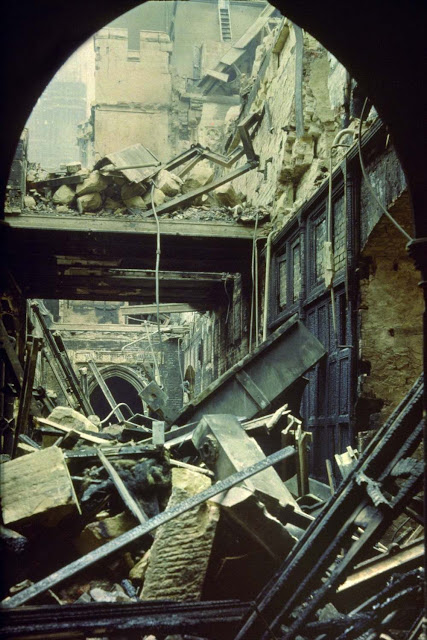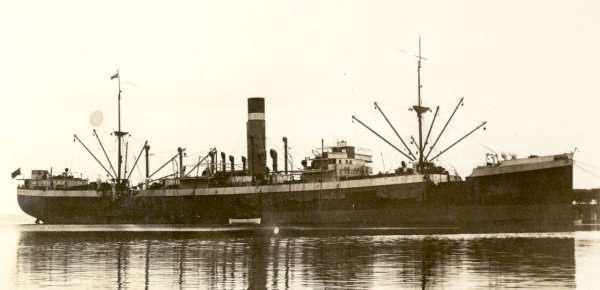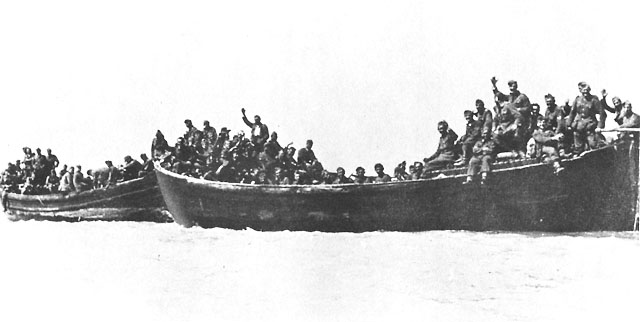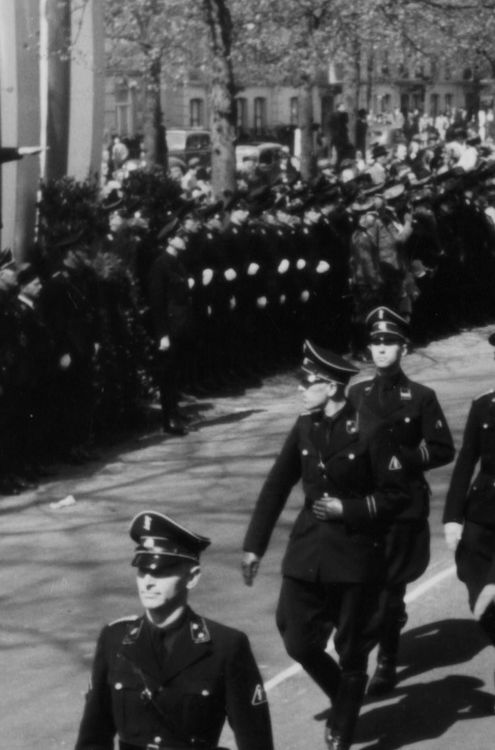Saturday 7 June 1941
 |
| Firemen battle blazes in Chungking (Chongqing), China resulting from the devastating Japanese air raid of the previous night. 7 June 1941. |
In anticipation of the invasion, planned to begin in earnest on 8 June, Royal Navy units depart from Port Said (Force C of troopship Glengyle escorted by anti-aircraft cruiser HMS Coventry and destroyers Hotspur, Ilex and ISIS) and Alexandria (Force B of light cruisers Ajax and Phoebe, with destroyers Janus, Jackal, Kandahar and Kimberley). The Glengyle carries men of No. 11 Commando to seize a bridge at the mouth of the Litani River in Lebanon.
The main invasion will not start until the early hours of 8 June. It is divided into three columns or prongs - west, center, and east. The three prongs are isolated and not mutually supporting.
The main prize is the coast road. It is the most direct route into Syria and can be easily protected by the Royal Navy and RAF. British commandos from ‘C’ Battalion British Special Service Brigade are assigned to land at key points just behind the border in order to disrupt the French response, but seas are heavy and look like they may interfere with that. The Australian 21st Brigade advances to capture a key bridge over the Litani River.
Further inland in the center, the Australian 25th Brigade is to take the French picket line along the border and then proceed inland. Poor French morale is expected to prevent a major response.
In the eastern sector, the Indian 5th Brigade has the objective of advancing to seize Deraa and reach Kuneitra.
None of these objectives are considered especially difficult to achieve by commanding General Henry Maitland Wilson. This is one of the least-known major operations of World War II, perhaps because it is an unprovoked act of aggression by Allied forces against a neutral power which tends to undermine their moral authority - though, let's be clear, the Allies have loads of surplus moral authority relative to the Axis.
European Air Operations: RAF Fighter Command conducts a sweep over France, and RAF Bomber Command sends 22 planes to lay mines. After dark, RAF Bomber Command sends 33 planes to attack Prinz Eugen, recently arrived at Brest. It is in dry-dock for engine repairs and an easy target, but the bombers score no hits.
Battle of the Atlantic: The British remain extremely jittery about a possible German invasion despite all the military intelligence they have been receiving about Hitler's plans in the East. In fact, a cross-Channel invasion would make great sense from a military standpoint - but Hitler apparently is not operating at this time from a standpoint of pure military logic. The weather is perfect, the entire summer lies ahead, London, Liverpool, and other cities lie largely in ruins, the U-boats are operating at peak efficiency - execution of Operation Sea Lion at this time would have ideal prospects. But, the Germans have no interest in England and are barely even pretending at this point to retain an interest in a Channel crossing.
U-38 (Kptlt. Heinrich Liebe), on its 9th patrol out of Lorient and operating off of the west coast of Africa, torpedoes and sinks 7628-ton British freighter Kingston Hill southwest of the Cape Verde Islands. There are 14 deaths. Some sources place this sinking on 8 June.
The Royal Navy shares the lingering concern about an invasion, and at 20:00 it receives erroneous reports of major German naval units at sea. The Home Fleet goes on one-hour notice, which is peak readiness one step short of actually going to sea, and remains on this alert through the night.
British 281-ton examination vessel No. 10 hits a mine and sinks at Milford Haven.
Newly commissioned destroyer HMCS Saguenay arrives at St. John's to join the new Newfoundland Escort Force (NEF).
Canadian corvettes HMCS Ville de Quebec (Quebec City) and HMCS Charlottetown (Kingston) are laid down, minesweeper Melville is launched at Levis, Quebec.
Battleship USS South Dakota (BB-57) is launched at Camden, New Jersey by the New York Shipbuilding Corporation. It is the lead ship of its class, with three more to follow, and is designed to fit within the limitations of the Washington Naval Treaty.
U-85, U-207 and U-332 are commissioned.
Soviet submarine Shchuka Class Serie X Bis Sub SHCH-405 is commissioned.
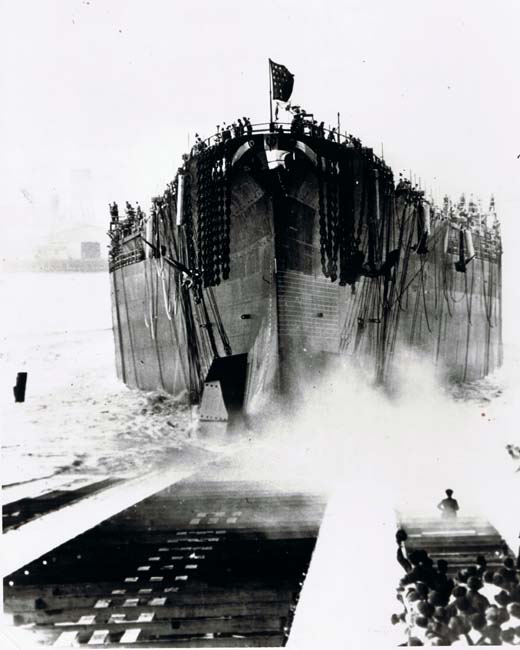 |
| USS South Dakota is launched, 7 June 1941. |
Italian bombers attack Tobruk.
The RAF, for its part, bombs Benghazi and Derna. RAF No. 830 Squadron, serving with the Fleet Air Arm on Malta, sends 7 Fulmar Swordfish against Tripoli Harbor to drop magnetic mines ("cucumbers").
An Italian convoy of three freighters escorted by destroyers Frescia, Strale, Marco Polo and Victoria depart from Naples bound for Tripoli. There also is distant support of two cruisers and three destroyers. While the Italian Navy has the resources to make an impact across the Mediterranean, it prefers to use its ships in these low-risk operations and retain its "fleet in being."
The ships of Operation Rocket - the ferry mission of Hawker Hurricanes to Malta - arrive back at Gibraltar without incident.
Operation Battleaxe, originally scheduled to begin today, has been pushed back to 15 June. The reason: delays in bringing tanks forward from Alexandria to General O'Moore Creagh's troops. The attack is to be a larger-scale version of Operation Brevity on 15 May.
Prime Minister Winston Churchill sends a message to Malta Governor Dobbie in reply to a pessimistic cable sent by the latter on the 5th:
I am entirely in agreement with your general outlook. It does not seem that an attack on Malta is likely within the next two or three weeks. Meanwhile other events of importance will be decided, enabling or compelling a new view to be taken. You may be sure we regard Malta as one of the master-keys of the British Empire. We are sure you are the man to hold it and we will do everything in human power to give you the means.The War Office also responds today to General Dobbie's request for more troops. It requests "further details" for defensive armaments. Dobbie responds immediately, listing a need for Bofors guns and anti-tank artillery.
There is an air raid on Malta during the early morning hours by Italian BR-20 bombers. The Italians bomb the Luqa, Manoel Island, Marsa, and Wardia areas, and in the process lose a bomber and perhaps two more at sea.
After dark, Sergeant J. Forman climbs the perimeter wall that had stymied their first attempt to blow up the station in May. He manages to get across without hitting any of the high voltage cables, then opens a door for his comrades. The team sets up plastic explosives within half an hour on each of the eight main transformers. Then, the team gets back on their bicycles and leaves. The mission turns from a failure into a success: six of the eight transformers blow up, and work on the Bordeaux submarine base is delayed by weeks. Electrified trains in the region have to be replaced with coal-burning locomotives. It will take an entire year to repair all the damage.
 |
| Damage at the Pessac Power station, 7 June 1941. |
The Germans in the commune of Pessac take reprisals. They shoot twelve German guards, fine the commune one million francs, imprison 250 people, and impose a strict curfew (21:30 to 05:00).
For the British, it is a massive success and enhances the prestige of the Special Operations Executive (SOE) after some failures.
| The US Asiatic Fleet in Manila Harbor, the 1930s. The Japanese began keeping close tabs on this fleet in early 1941. |
German/Bulgarian Relations: Hitler meets with King Boris of Bulgaria in Berlin.
German Military: In preparation for Operation Barbarossa, long columns of Wehrmacht troops are heading east in Poland. This is very noticeable to locals because the military vehicles clog the roads and all civilian vehicles are prohibited for hours at a time. Full vehicles are traveling east, empty ones back to the west. Of course, civilians see the military traffic on the roads, and it is fairly obvious to them what is in store. A local, Polish physician Zygmunt Klukowski, writes in his diary that it "is the same as during a war."
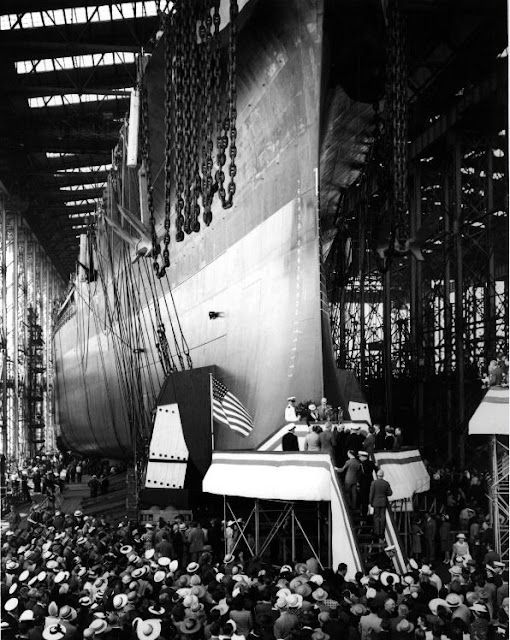 |
| USS South Dakota at its Christening, 7 June 1941. |
Despite increasing evidence of German troop buildups along the border, Stalin prohibits any "provocative" defensive precautions. Everything is to remain as is, with the Soviet Union continuing to fulfill its trade agreements with Germany and sending supply trains west across the border.
 |
| Former President Herbert Hoover, giving the Commencement address to the graduating class at Haverford College, 7 June 1941. |
The US Maritime Commission is implementing the new ship-seizure law signed by President Roosevelt on 5 June. The inventory includes 39 Danish, 28 Italian and 2 German ships, along with random ships from Estonia, Lithuania, Romania, and other nations. The fast (Blue-Riband holder) 83,423-ton French liner Normandie remains docked at its berth in midtown New York and also is subject to seizure, but there are no plans at this time to use it.
US Government: President Roosevelt departs the White House at 11:30 for Annapolis and embarks on a weekend cruise on the USS Potomac. He is accompanied by Crown Princess Martha of Norway, Princess Ragnhild, Harry L. Hopkins, Robert Hopkins, Diana Hopkins, Capt. John R. Beardall.
 |
| Joe DiMaggio at the plate in Sportsman Park, St Louis, MO, June 7, 1941. Also visible is Hall of Fame catcher Rick Ferrell and umpire Bill Grieve, with Yankee Charlie Keller on deck to the left. |
Holocaust: There is an outbreak of typhoid at Zamość Prison in southeastern Poland. Unfortunately, the local doctors are inmates in the prison, too.
We have been told with monotonous repetition by the collectivists and left-wingers that our frontiers are gone. They say our industrial plant is built. They claim there is no safety valve for human energies. They assure us that we have come to an age of humdrum problems of underconsumption, overproduction, and the division of the existing pot. They say that new opportunity for youth has shrunken. That is not so. There was never in history a more glorious frontier for youth than today. Adventure and opportunity beckon in every avenue of science. They beckon from the great profession of men trained to research. They beckon from its thousands of applications. From it spring tens of thousands of new services and industries. In them human courage, character, and ability have an outlet that never came even with the two-gun frontiers.Meanwhile, 24,000 people pack Chicago Stadium to hear speeches against the America First movement. Abraham Lincoln biographer Carl Sandburg calls Charles Lindbergh President Roosevelt's new "Copperhead," a Civil War term for Democrats in the North who choose to oppose the war and advocate a negotiated settlement with the South.
Whirlaway wins the Belmont Stakes by three lengths and completes the U.S. Triple Crown of Thoroughbred Racing. It is the fifth horse to accomplish that rare feat.
Golfer Craig Wood wins the U.S. Open.
Joe DiMaggio hits in his 22nd straight game in Sportsman Park, St. Louis, Missouri. He gets three singles in an 11-7 win over the Browns.
"My Sister and I" by Jimmy Dorsey and his Orchestra reach No. 1 on the new Billboard singles chart.
The UAW strike at the North American plant in Los Angeles that began on 5 June continues. President Roosevelt is considering exercising emergency powers by taking over the plant unless the strike ends.
 |
| The New Yorker - Saturday, June 7, 1941 - Issue # 851 - Vol. 17 - N° 17 - Cover by Ilonka Karasz. |
June 1941
June 1, 1941: Farhud Pogrom
June 2, 1941: Massacres on Crete
June 3, 1941: Kandanos Massacre
June 4, 1941: Kaiser Wilhelm Passes Away
June 5, 1941: Death in Chungking
June 6, 1941: Hitler's Commissar Order
June 7, 1941: Commandos Strike at Pessac
June 8, 1941: British Invade Syria and Lebanon
June 9, 1941: Litani River Battle
June 10, 1941: British Take Assab
June 11, 1941: Hitler Thinking Beyond Russia
June 12, 1941: St. James Agreement
June 13, 1941: Lützow Damaged
June 14, 1941: Latvian June Deportations
June 15, 1941: Operation Battleaxe
June 16, 1941: The Old Lion
June 17, 1941: British Spanked in North Africa
June 18, 1941: Turkey Turns Its Back
June 19, 1941: Cheerios Introduced
June 20, 1941: Birth of US Army Air Force
June 21, 1941: Damascus Falls
June 22, 1941: Germany Invades Russia
June 23, 1941: A Soviet KV Tank Causes Havoc
June 24, 1941: Kaunas and Vilnius Fall
June 25, 1941: Finland Declares War
June 26, 1941: Bombing of Kassa
June 27, 1941: Encirclement At Minsk
June 28, 1941: Minsk Falls
June 29, 1941: Brest Fortress Falls
June 30, 1941: Mölders Becomes Top Ace
2020






